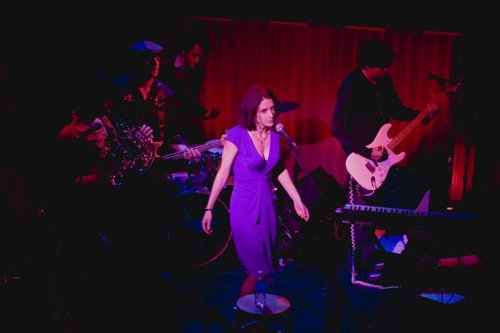
 On
March 3rd,
Joe’s Pub, located in
On
March 3rd,
Joe’s Pub, located in
“It was a wonderful night and
we really filled the place out. All kinds of people, both whom I knew and whom I
didn’t know, came out. People who were on the record and a smattering of other
people who have been playing with me recently, were all on stage, at different
intervals. The setting (of Joe’s Pub) is so great, because you can put on a real
show. I enjoy playing smaller venues, but Joe’s Pub is the perfect size. We
caught a wave and you don’t always know if you are going to,” says Jost, in
recalling the night of her CD release.
Although it is still early,
some songs are emerging as early fan favorites. “A lot of people like the intro
to “Jump,” when I use a made up language. People relate (well) to the cello and
the voice combination (in “Jump”).
“Awake In My Dream,” comes out for a lot of
people, and I don’t know why exactly. People also like the Iris Dement cover
(“Our Town”). The original version of “Our Town,” is longer, but I edited it
down a lot. Our version is totally different, but people enjoy the way that we
have done it. A lot of people enjoy “Halfway There,” because it is catchy, and
it is a real pop song. “Stowaway,” seems to be something that people relate to
on an emotional level,” says Jost.
Serena Jost is a very accomplished storyteller whose
lyrics do not leave the listener grappling with vague metaphors or symbolism,
but instead are easy to follow, and more importantly easy to relate to. However,
Jost’s music is not totally dependent on her skills as a lyricist, far from it.
She is a wonderfully creative composer. Although Jost’s music is closer to an
alternative folk rock style than anything else, there is no mistaking the fact
that she often borrows from her classical training as a cellist, as she did with
the song, “Awake In My Dream.”
The song “Jump,” is
introduced by
The song, “Jump,” also features Jost playing the keys
and guitarist Julian Maile lets loose with some incredible riffs that sure sound
pretty edgy and rock driven, for a guy wielding a classical guitar.
“He (Maile) is an incredible
guitarist and one of the things that I like about Julian is he will never rest
on his laurels, or do the same thing twice. He goes for it full on, and
sometimes he just rams it up against the wall. More often than not, the risk
totally pays off. That’s one of the things that I really love about him. We have
very little need for communication. I can bring a song to a rehearsal and he
drops into the center of it.
In the studio (when it came to) “Almost
Nothing,” I remember saying to him, ‘I want you to move a wall with the solo, as
if you were moving a boulder or something.’ That’s all that I said, and then he
did his thing. He takes chances and he doesn’t fear the outcome, which is why I
think you get some of those really vital moments,” says Jost.
Serena Jost also invited her friend, alternative pop
artist Greta Gertler to join her for the song “Almost Nothing,” and that led to
Gertler recommending to Jost that a third New Yorker, Alice Bierhorst join
Gertler in providing the backup vocals.
Jost recalls, “When we got to
the studio I was really excited about the timbre of